what's new
latest news and updates
2024-02-04 17:49:33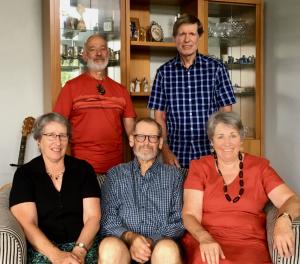 Lovely to meet up again with my siblings in NZ. Catherine is officially retired by still working part time in various capacities, Richard is dealing with some health issues but keeps active never-the-less, Annemarie has just retired from nursing and Stephen, who is writing books has just turned 65, so enters the "senior" category with a government pension I am still working full-time and in NZ am not recognised as a "senior". NZ Holiday2024-02-04 17:42:33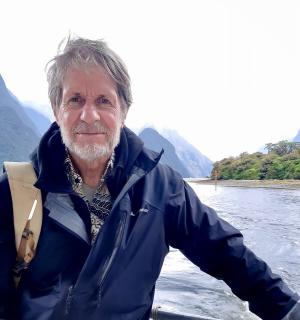 Just back in PNG after a welcome break in NZ. I travelled right up to Cape Rienga and down as far as Milford Sound and was impressed again by the pristine beauty of the New Zealand environment. That is not to say that there are no problems or challenges, but coming from tropical PNG that struggles with rubbish disposal, it was a pleasure to experience the relative cleanliness when it comes to garbage. Recovery2020-01-15 10:55:48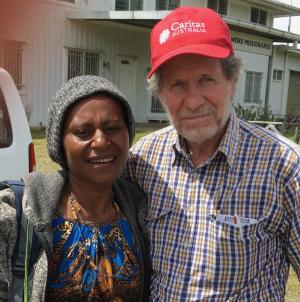 I have many sad tales to tell about those affected by Sorcery Accusation Related Violence, but now I had a joyful tale. Regina was so badly affected by the torture as a suspected witch that after over a year in hospital she was discharged with a colostomy which greatly restricted her activities both physically and psychologically. Fortunately after many years she had the opportunity to go to Australia for surgery to allow her to regain her regular bodily functions and have the colostomy removed. I met her recently in Mt Hagen and it was a delight to see her so relieved. I am sure the psychological scars remain, but she is now lookng forward to a new future. She hopes to study for her matriculation and then to train to be a nurse. After her years of medical treatment I am sure she will have great insights to build on in her nursing service. The photo show us when we met in Mt Hagen. Highlands2019-04-06 15:55:36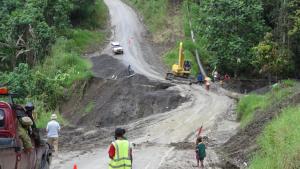 After the Graduation I took 10 days for research and meetings in the Highlands. One of my tasks was to collect data for a case study on a case where a woman was accused of witchcraft and tortured. I also visited and met with a number of people who act as "recorders" in one of the research projects on Sorcery Accusation Related Violence (SARV). Travelling in the Highlands is often a challenge with landslides or washed out bridges. This time we had to wait in the Madang Hills part of the Highway while an excavator made quick repairs on a culvert that was collapsing, as shown in the photo. International Womens' Night2019-04-06 15:49:43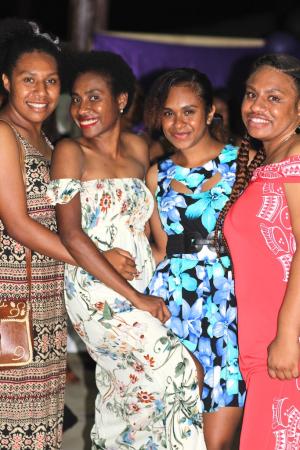 Gender equality is an important aspect of life at Divine Word University. Statistically at least there are almost equal numbers of male and female students, with women slightly in the majority. International Womens' Day occurs on the 8th March and at DWU it is celebrated around that time with International Womens' Night. It is a chance for the young women to dress formally and for some to invite their boyfriend to come with them. I was asked to give a short talk on women and emancipation in New Zealand. Having lived away from NZ for so long I had to ask around to get some pointers on what to say. Graduation 20192019-04-06 15:43:36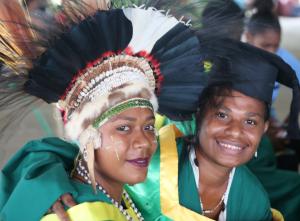 Over 800 people graduated this year on 11th March. With so many graduating the ceremony lasted four hours, including addresses from the Chancellor Archbishop Young, President Cecilia Nembou, and keynote speaker Dr Eric Kwa who is Secretary for the Department of Justice and Attorney General. His call for students to be citizens of integrity is a timely message at this time in Papua New Guinea. Graduates have left, some to work and others to continue looking from employment. I was MC for the occasion. DWU - a New Year2019-04-06 15:30:40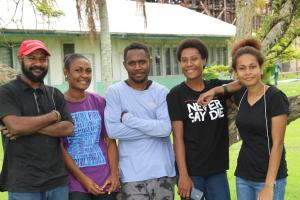 Staff have several weeks to prepare and then the students arrive. We have enrolled some 1700 students this year on the Madang campus. They come into the four faculties: Arts and Social Sciences (which includes Communications Arts), Education, Business and Informatics (which includes Tourism and Hospitality), Medicine and Health Sciences. Aside from the 1700 undergraduate students there are those doing Masters and Doctorate, some of them studying part-time through flexible learning. Missio2019-04-06 14:40:28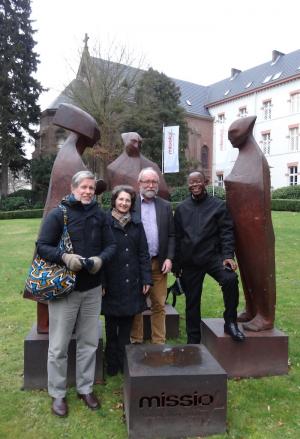 I was asked to attend a meeting at Missio Aachen, Germany to develop a manual on theology from a "South-South" perspective. I am representing Oceania so it is an interesting challenge presenting theological texts somehow representative of our part of the world. The photo shows me in front of the Missio building ogether with the Director Dr Harald Suermann, translator Helen Büchel, and Nathanael Yaovi Soede from Côte d'Ivoire. It was rather chilly in January in Aachen.... More Family2019-04-06 14:12:20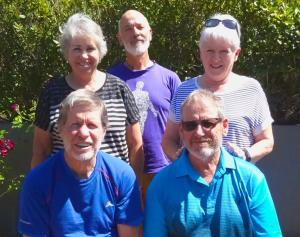 This time Stephen is with us (at the back) but unfortunately Annemarie had already returned to Hamilton. As time goes by we all get into 'retirement' - whatever that means. For some it involves caring for a growing family of grand-children. For me retirement is some time off and I anticipate there will be plenty to occupy me before then Family Gatherings2019-04-06 14:05:44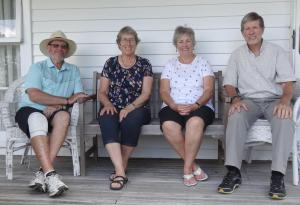 Christmas at home is a great chance to get together with family. The photo shows Richard who looks a bit worse for wear with his knee, then Annemarie who had come down all the way from Hamilton for the occasion. Then Catherine at whose house I was staying. Finally on the right, myself, enjoying the break . Stephen was a away cycling in the South Island Aotearoa New Zealand2019-04-06 13:58:41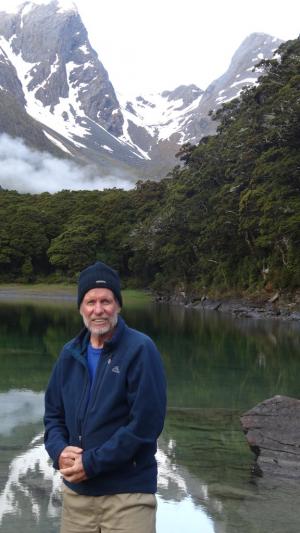 After five years, back in New Zealand. It provides a wonderful chance to go into the mountains - no computer - no phone - fresh air and fabulous views. Together with Annemaria and Russel, I went on the Routeburne Track and then on the Caples track back towards Queenstown. There are places that test one's fitness a bit, but the beauties of the natural surroundings, the waterfalls and the birds (even including some Keas) was worth it all. The photo shows me late one afternoon at Lake Howden. The mountains are reflected in the lake behind me. It is hard to choose just one photo because there was picturesque scene around almost every corner. However this one is my favourite 40 years ordination2018-11-11 18:13:55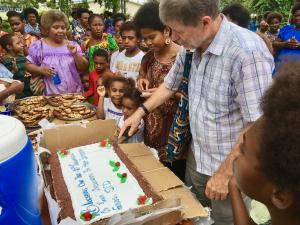 I was ordained as a priest on 11 November 1978 - 40 years ago today. The congregation at Divine Word University were aware and arranged for cake and cordial after mass this morning. Everybody was happy, including me. Venus Point - Tahiti2018-10-13 14:01:23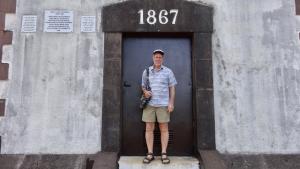 A day following the Pacific Islands Universities Research Network conference in Tahiti - yesterday at Point Venus. Captain James Cook and companions travelled to Tahiti in 1769 to observe the rare transit of Venus – the second in that century. It was an attempt to accurately measure the distance of the sun from the Earth. Cook arrived on Tahiti in April 1769, and established Fort Venus on the northeast end of Matavai Bay. On June 3, 1769, the weather turned out to be favourable, and Cook and his companions dutifully recorded their observations. As it turns out, Cook’s observations were flawed - yet still remarkable considering the available technology. The journey didn’t end there. He continued on to the South looking for the fabled southern continent. Rededication of classroom complex2018-10-01 01:21:26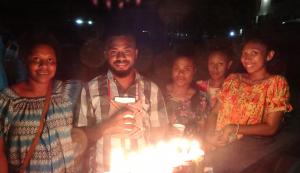 Last Thursday saw the rededication of the Business Studies complex at Divine Word University. Two months ago a student was found dead, hanging from the back of the complex and many students and staff have felt vulnerable and fearful after the tragedy. Police still have not completed their evaluation of the event, which they are treating as suspicious. Suring the ceremony we had several readings, including Psalm 91, the renewal of baptismal promises, and a candle-light blessing of the whole complex, with simple crosses mounted in each room. The photo shows some of the participants with thier candles. Human Rights Film Festival2018-10-01 01:15:23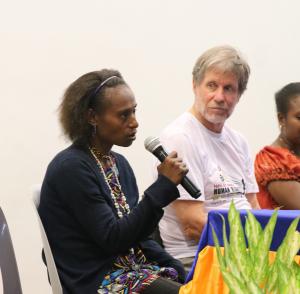 Today we finished the third day of the PNG Human Rights Film Festival at Divine Word University. The festival provided an opportunity to show 20 films, most from PNG and 6 of them being screened here for the first time. Topics ranged from HIV and discrimination, sorcery accusation violence, corruption, LGBT issues, development for Bougainville, humah rights for Manam Islanders, and educational issues. It was the premier for one of my films, "Everybody's Business" about sorcery accusation related violence (SARV) in the Highlands. I found many of the films inspiring and thought provoking. The photo shows me with Regina Arre who is a survivor of that SARV. Synod in Suva2018-07-08 21:13:16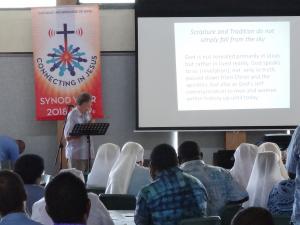 At the end of May I travelled to Suva in Fiji following an invitation by Archbishop Peter Chong to come and assist with the diocesan Synod. We had 3 days with priest and religious and then 3 days with lay leaders from throughout Fiji. I gave talks on 'The Historical Context of Jesus' Mission', 'Globalization' and 'Development in Theology and Church from Vatican II to the present day'. I enjoyed the occasion and was suitably impressed by enthusiasm and energy that participants put into the event. The synod is an opportunity for the Archbishop for formation of the people and to plan for the future. ANZAC Day2018-04-29 20:13:18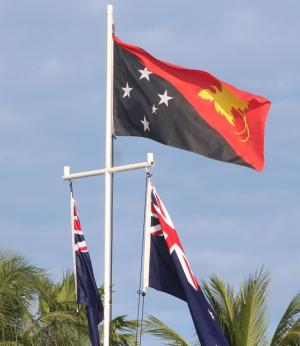 Along with NZ and Aust, April 25th is celebrated here in PNG as ANZAC Day. It is heart-warming to see the New Zealand and Australian flags hoised besides the PNG flag. This year we had a good turn-out at the dawn parade in Madang. We had a representive from the Austsralian armed forces and Maureen Hill and myself represented New Zealand. Over 100 PNG students from Divine Word University attended, and along with Sir Peter Barter of the Madang Resort they provided breakfast afterwards. We even had a fly-by with a helicopter supplied by Heli-PNG. A good day to remember those who gave their lives. In the going down of the sun and in the morning we shall remember them. We also prayed for peace between nations and within communities and families in Papua New Guinea Graduation2018-03-12 00:29:20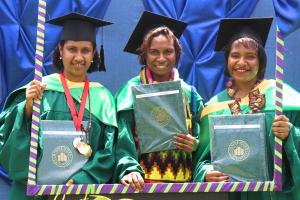 Graduation today on the Madang campus of Divine Word University. 871 graduates from four faculties: Arts, Business Studies, Education and Health and Medicine. Many excited people completing their studies and hopefully going out into the workforce. Some - those doing flexible learning courses are already in the workforce. Organising a graduation on that scale is quite a task requiring a lot of team work. Fortunately the team did work well and it was a memorable day. The photo shows several women who graduated today. Academic Year 20182018-02-25 19:57:47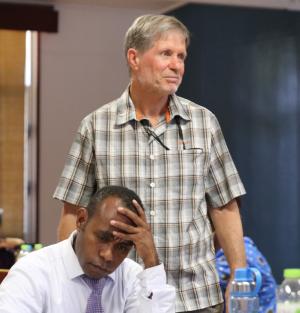 Students have been registering over the past two weeks. We were expecting about 1600 students to register, but numbers are down, possibly due to transport difficulties (they have not received their airline tickets) and shortage of funds for school fees. The school fee for regular students is K10,000 and theyneed to pay at least K700 (US$230) to register . That sounds like a good deal to get food, accomodation and tuition for a year, but it is a huge amount for many parents who are subsistance farmers. Yesterday I helped facilitate a Day of Recollection and Team Building for the Students' Representative Committe (SRC). They are an impressive group. We started off with a game where we introduced ourselves with our name etc plus those that had gone before us. That meant that the 25th person had to remember the names and any other details of the 24 persons before them. Most seemed to have no difficulty remembering (I did.....) A Busy Year2017-12-25 19:52:13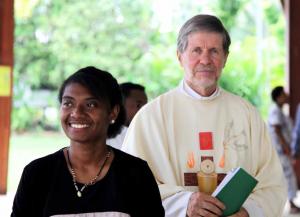 I have not posted much on my blog this year. That is an indication of shortage of time and the inability to keep up with everything. Recently at DWU we had a "missioning" ceremony for the fourth year students who are finishing up their studies and who hope to graduate early next year. Divine Word University makes student "transformation" with "core values" a priority and the missioning is like saying to the students and their parents and guardians - "You have been with us for four years. We have done our best to provide an opportunity to grow as resourceful, honest, citizens ready to utilize your gifts, talents and abilities to advance the genuine well-being of the people you encounter and the nation as a whole." In recognition of this they are presented with a small cross. I was the principal celebratnt at the mass that accompanied the missioning ceremony and the photo was taken then as we prepared to begin. Academics and the University2017-04-03 00:32:27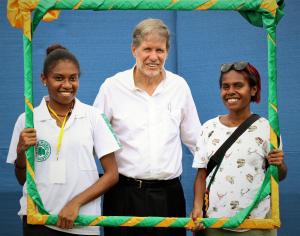 I have some challenges now at Divine Word University. I have been appointed as Professor of Social Research and as Vice President for Research and Higher Degrees. That is a mouthful isn't it. I am happy to take on the challenge. We have about 1600 students this year at our Madang campus and there are many others coming in under the "flexible learning" programs where they come for two weeks of intensive class work and then return to their homes in various parts of PNG and Solomon Islands to complete assignments. Recently we had graduation with over 900 graduating. It was a joyous occasion. The students from the communications department set up a photo-booth and I attach a photo here at the booth with two of the students. Christmas 20162017-01-23 00:23:00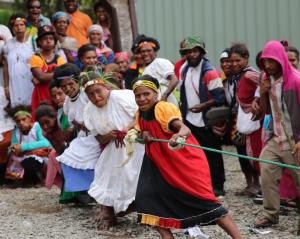
The mountains of Porgera again for Christmas. This time based at Paiam while the parish priest Fr Tarsi went to the communities in Paiela – the next valley. The people at Porgera amazing. For them Christmas is about celebrating Jesus’s birth and they really enter into the spirit of the feast of Christmas. People came and cleaned the church and church grounds. Another group spent a whole day constructing a crib. In the evenings the youth came to practice for the choir. Others were getting ready for baptism and first communion. I spent long hours sitting hearing confessions for the Sacrament of Reconciliation. The people come speaking mostly in four different languages, Ipili, Enga, Pidgin and English – a fascinating variety. Christmas eve and Christmas day the church was packed to capacity, with the children all up around the altar to make space for the adults. It can be bleak there in the mountains but people did not seem to mind that it was pouring with rain and quite chilly outside. After mass on Christmas day we had a time of games. You can see in the photo part of a womens’ tug-of-war....
Retreat2017-01-22 20:43:18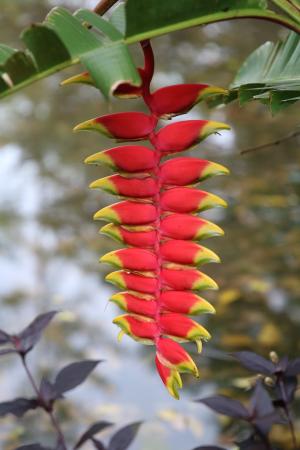 Retreat is a chance to stop and take stock of life, physically, mentally, spiritually. I spent a week at the house of prayer at Goroka in the Highlands. The house of prayer has beautiful gardens with many varieties of tropical flowers, along with ponds that are home to frogs and various other water dwellers. The grounds also serve as the mission cemetery, with the graves of many hard working missionaries, plus some pioneer explorers too like Jim Taylor. It was a time simply to be without phone-calls, internet or a busy schedule, simply a day interspersed with walks in the gardens and periods of prayer and reflection Men of Honour2016-08-21 13:33:45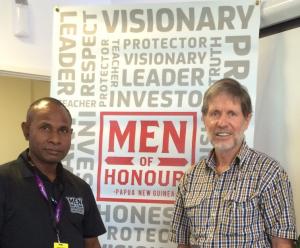 Last week I was invited by the Digicel Foundation in Port Moresby to give a talk to a group of men assembled for what they call the "Men of Honour". These are men committed to peace and ending violence, particularly violence against women. I spoke about how we are born male or female but through life we learn how to be a man or woman of honour and integrity. Often men are taught to be agressive and "strong", but unfortunately sometimes this comes out in practice as a form of domination. If boys and men accept systems of domination because they believe it is the path to power and mastery, then we can chose an alternative and learn to embrace positive masculine roles. The redemptive masculine principle takes courageous man who refuse to enjoy patriarchal privileges and work for gender justice. Flying Foxes2016-06-13 18:09:02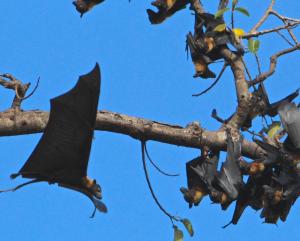 In Madang there seem to be an infinite number of flying foxes. They like to rest in the large tree outside the place I stay at Divine Word University and they make their presence felt starting 5am when they all start to shreek at once. I don't need an alarm clock. An hour or two later they take off in clouds of black figures - off to where I am not sure, and mid- afternoon they return again to hang upside down on the tree branches. I know they are all part of God's creation, but to me they are not a pretty sight with their hooked black wings and sharp claws. What is more, as they take off in the morning they seem to make themselves lighter for the the flight by enjecting a very sticky poo that ends up staining my car (and my head too if I am unlucky). Divine Word University2016-01-31 20:51:23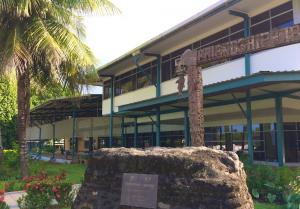
Divine Word University in Madang, PNG was established 20 years ago by an Act of Parliament. It developed out of Divine Word Institute started by the Divine Word Missionaries and Holy Spirit Sisters back in 1977. So now I have come to take a position as Head of Department of Governance and Leadership – a department that specialises in Flexible Learning. The University is entering into the third decade of its strategic plan and the emphasis now is on promoting Research, quality learning and on developing courses through Distance Learning – all presenting challenges for staff and students alike. At the moment it is quite peaceful here but after another week the students will come – over 1000 of them - and the campus will take on the vibrance of a tertiary centre of learning. In the meantime I am getting used to the tropical climate and the racket of thousands of flying foxes that spend their nights in a big tree outside my window. The accompanying photo shows the “Friendship Library” at the University.
Christmas at Porgera2015-12-27 00:47:03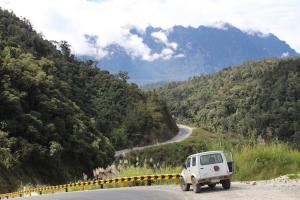 Christmas in Porgera! I left there in 1983 – that is 32 years ago! With a huge goldmine and people coming from all over the world, one can imagine that there would be some changes, and there are! I could not help noticing, especially with the young people how they are now part of the digital world – reading Christmas hymns from their smart phones! There they were singing in 4 languages (Enga, Ipili, Pidgin, English). There is another side to it though, with people refugees from tribal fighting at Tipinini and deterioration at Paiam town with the market and sports ground seemingly abandoned and the hospital closed. Now with the road to Paiela open and people commuting from there on landcruisers (40km from Kolombi in Paiela to Porgera) there is a lot of change there too. People seemed happy to see me – the older ones remembering the “old days” and my meeting the younger ones for the first time. The formerly difficult and rough road is now sealed, but the scenery on the drive in remains spectacular as the photo shows. SVD Chapter2015-12-04 19:54:36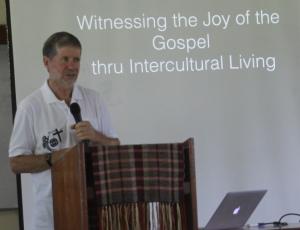 Every 3 years we members of the Divine Word Missionaries get together in what is called a Chapter. We just completed a week of our Chapter here in Madang in PNG. It was a good experience with 32 participants. We were 10 nationalities. We have noticed ongoing changes both in our context and within the SVD. In PNG there is rapid socio-economic development yet an increasing gap between rich and poor. In this situation we recognize the importance of our involvement in promoting Justice Peace and Integrity of Creation —a message central to the teaching of Pope Francis. Internal to our own membership in PNG we notice radical changes with formerly dominant nations from Western Europe and North America having far fewer numbers, and local PNG members and confreres from the Asian zone showing their influence instead. Our willingness to learn to communicate in new ways may be seen in the way our debate during the chapter has been expressed respectfully in English, yet only two of the capitulars have English as their first language.
Frost2015-08-29 20:00:52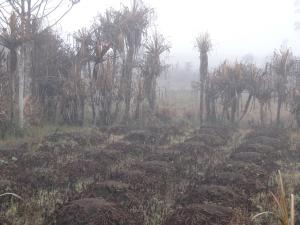 Some of the valleys where people live in the Highlands are quite high with people building houses and food gardens up to almost 3,000 m. The people of the Kandep District are a particularly hardy people living with cold and mist for much of the time. In August, with the el niño weather condition, cool winds and clear skies contributed to the spread of severe frost over much of the Highlands. People whose principal food is sweet potato no longer have their staple because the frost quickly freezes the leaves, so that the foliage becomes dry and dead. The frost not only killed the sweet potato but the pandanus trees and other plants as well. A few days ago I drove through Kandep and saw for myself the destruction. The whole area was just brown and black as though a huge bushfire had swept through the area. It was not fire but the burned effects of frost. People are there recovering what they can. Many presume that the government will come to them with food assistance. They need it, but it is unfortunate when it contributes to an unsustainable handout mentality. I hope people will take the chance to preserve their pride and help themselves and others too. Restoring Peace in Bougainville2015-07-25 14:07:13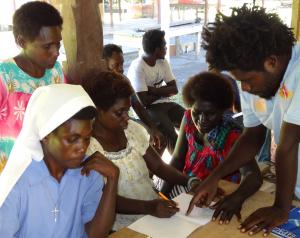 I spent a week assisting Sr Lorraine CSN and her team on a peace-building workshop at Moratona in South Bougainville. The people are gradually recovering from a terrible civil war (called the “Bougainville crisis”) in the 1990s in which thousands of people died. It leaves a generation of “lost” young people today who never had the opportunity for formal education. There are also wounds of guilt, fear and suspicion. My particular input was about sorcery, sometimes called “posin” in Bougainville. There have been a number of wretched cases where someone has died and people have been accused of causing the death through sorcery. The accused have been tortured and brutally killed. The situation is complex with elements of traditional divination rites, jealousy, family rivalry, and attitudes carrying over from the “crisis”, to name a few. What is the road to peace? What will enable the necessary spiritual renewal? How will factions surrender their weapons (and surrender themselves)? When can exiled families return? How will remains of the dead be retrieved and given a decent burial, and how can all factions mourne and have justice and peace restored? These are only a few of the questions we face. Mass Burial2015-06-26 15:28:34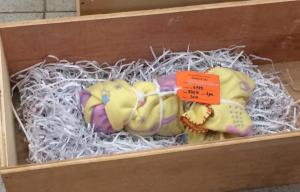 In recent times mass burials have been arranged in Port Moresby when the morgue is full with unclaimed bodies. Why would people leave their relatives to be buried by the city council? It seems that the main reason is that they are so poor. It costs money for a funeral and many people find it hard enough to get enough food for their extended family each day, Another reason is shame. Sadly the HIV rate is high in the city, and with stigma and discrimination, some dying from AIDS are simply abandoned. About one third of the bodies are of tiny babies. Some of these are babies that have been subject to infanticide, their bodies discovered somewhere in a rubbish bin. The day I attended there were bodies of 14 adults and 11 babies. Workers used a felt pen to write the name of the deceased on the lid of the box. I was sad to see some boxes were labelled “unknown.” I noticed one little parcel being put into a box containing shredded paper (see photo). It looked like a rag doll. But then I realised that it was in fact the body of a tiny baby, wrapped in the baby blanket that her mother must have brought thinking that she would carry her little daughter home. The baby has gone to a different home now. I took a second look and with new insight it reminded me of a humble manger scene from a Christmas crib… At the local cemetery a deep hole had been dug with a tractor and backhoe. It is sad, that these people, especially the “unknown” had no one to shed a tear for them on such an occasion. It seems to me that they are the poorest of the poor in Papua New Guinea today. But they did have someone to pray for them and I felt privileged in that. A workshop with young religious2015-05-31 18:29:57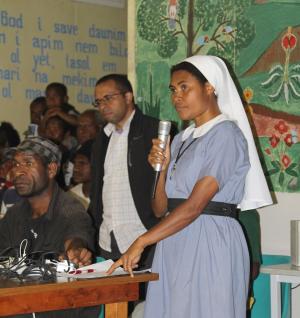 I Just spent a fascinating week facilitating a workshop with 45 junior religious (sisters, and others preparing to join sisters, bothers or to study for the priesthood). They seem very interested in the topic (Interculturality). It was about how we relate with those from other nationalities, but also with those from other ethnic or language groups in Papua New Guinea. They seemed so full of energy. We would schedule a class at a certain time and there they were gathered, singinging, 20 minutes before time. We dealt with issues such as stereotyping that blocks us from entering fully into the world of other cultures, exit and entry learning that are part of the dynamics of leaving the security of one’s own culture and entering into another, and skill builders for intercultural competency. They found the Intercultural Conflict Styles Inventory (ICSI) fascinating – discovering the way they respond to conflict. On the final evening there was a delightful cultural-social night with ample talent for games, song and dance, including the Mt Hagen and Wabag “Waipa” dance. It was an encouraging week. Seems there is a bright future for religious life in the PNG Highlands. Accusations2015-03-08 14:33:33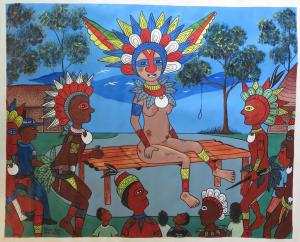 In recent times there seem to be an increase in witchcraft acccusations in areas where such practices were not part of the tradition. It is speading like a virus in an area where there is little resistance. When someone dies people start asking, not "what" was the cause of the death, but "who" was the cause. Usually those accused are weak and without community support. Most often they are women. In order to find out more about this issue, hopefully in an effort to reduce the incidence of such cases I am working with a group of "observers" who text in details about deaths and any subsequent accusations using SMS messages into a central mobile/cell phone. So far we have recorded information on over 80 deaths in the area being covered. Not all deaths result in accusations but in the cases where there has been talk of witchcraft as a cause, we have done further investigations and also try to help the accused receive support. We work against the commonly held notion that you can "torture the truth out of a person." The accompanying picture is by talented Simbu artist Osgar Towa depicting the torture of a woman in Mendi in the Southern Highlands in 2013. Fortunately she received timely protection and medical attention and has found life in another part of PNG thanks largely to the assistance of some religious sisters and a priest surgeon. We are working to find ways that such fear and violence can be reduced and even eliminated.
Last Rulna2014-12-31 17:06:40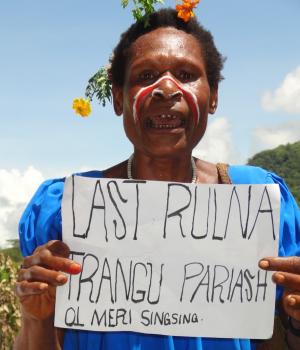 I Just returned from Rulna Parish near the Jimmi Valley. It used to be a thriving parish with school, health centre, agricultural projects, workshop, hydro, and so on. But then about 18 yrs ago the road closed in a major landslide, the parish became isolated, things broke down, communication became difficult, the parish priest left, and gradually life reverted back to the “bush”. So for me it was an experience like camping, with a long walk in (and out), fetching water, a candle for light, and … for a real change no chance to stare into a computer screen. Having only the occasional visit from a priest, the Catholic community made me most welcome. I had plenty of fresh tropical fruit such as pineapples and dined on wild turkey eggs. After mass the people danced and sang. The photo shows a woman carrying a sign: “Rulna the last unfortunate parish where women sing and dance” – last in terms of being isolated and unfortunate in not having regular services. In a way though they are fortunate because during my time there I experienced none of the problems of alcohol abuse, drug abuse and the like that one has to face in the town. If ever they do reopen the road, hopefully the people can develop some sort of community law and structures to enforce it, so that they can have some order in the midst of change. Bougainville2014-10-05 13:24:29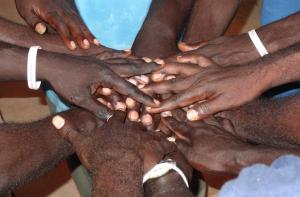 With a team from Caritas Australia I just completed a week in Bougainville — in a training for men as advocates against gender-based violence. Bougainville has its own history of violence, particularly with the "crisis" in the 90s when the Bougainville Revolutionary Army led a revolt sparked off by unjust circumstances associated with the Panguna copper mine (See the film "Mr Pip"). With the Bougainville Peace agreement the situation is quieter now, but still a lot will have to happen before there can be real peace on the island. In Buka town it was sad to see so many men under the influence of alcohol. Domestic violence and other forms of gender-based violence also hurt people and the society. That is why we had the training, to help Bougainville men analyze the root causes of gender-based violence related to the Bougainville context and to help men understand that they have a crucial role to play in preventing gender-based violence and build allies with women for the elimination of violence. The picture depicts a moment when some of the men demonstrated actions that counter violence. Cultural Shows2014-08-15 22:44:05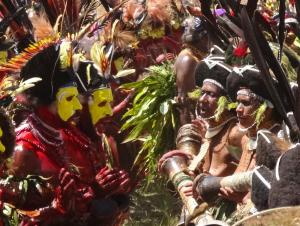
August and September are the months for spectacular cultural shows in PNG. Last week we had the Enga Show, tomorrow the Hagen Show. Next month there is the Goroka Show and the Hiri Moale in Port Moresby. These shows are annual events and provide an opportunity for people to dress up and “show” their traditional costumes, dances and songs. The accompanying photo shows a group of male dancers from Tari in Hela Province on the left and some young women from the SiliMuli group in the Upper Ambum of Enga Province. Normally such groups would not dance together, the men came and danced behind the women, the the women turned around and danced with them – something not normally done – but one never knows in the land of the expected unexpected. Intercultural Competence2014-06-17 19:41:27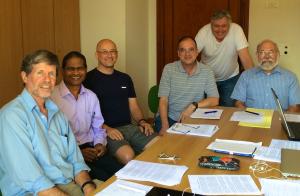 I just returned from a meeting at the Divine Word Missionaries (SVD) house in Rome - the goal being to develop resources that could serve in a workshop for local SVD communities around the world on the theme of developing intercultural competence. What on earth is that? Well, intercultural refers to the sustained interaction of people raised in differing cultural backgrounds. Through intercultural living we move from mere toleration and acceptance to a mutual transformation that celebrates difference. Living an intercultural life marked by deep respect and mutual sharing among our SVD confreres is part of our missionary witness. The workshop we designed will hopefully help us deepen our appreciation of intercultural competence for intercultural life and mission. We have included tools and processes to help us learn where we stand in this ongoing transformation process - including tools such as Intercultural Competency Scale (ICS) and Intercultural Conflict Styles Inventory (ICSI). Through assessing where we stand as individuals or as communities we can develop strategies for achieving greater intercultural competence. The idea is that action steps and policies will help guide individuals and groups in forming individualized and group action planning to help us reach a further step in our journey toward intercultural competence. The accompanying photo taken in Rome, shows some of the committee members after myself there is S.M.Michael, Alexander Rödlach, Bob Kisala, Jon Kirby, and Roger Schroeder. How to accompany the marginalised?2014-04-03 14:02:35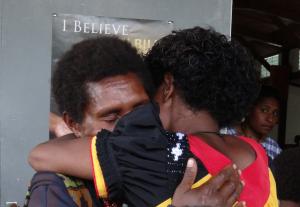 In recent times I seem to have increasing contact with people who are marginalized, particularly those rejected and sometimes having endured terrible torture because they were accused of using sorcery to harm or for harbouring demonic spirits thus being regarded as "witches". I think the Church has an important role in helping to counter such damaging beliefs, striving to understand and improve the social conditions that foster such accusations, and supporting the "victims." I qualify the term "victim" because here in PNG the victim may be the person presumed harmed by the sorcerer, or it may be the marginalized, tortured (or even murdered) person accused of being a sorcerer. Recently I accompanied a woman who had undergone this experience, bringing her back for a visit to her home community, and to join her husband and children, and the Church community for the Sunday mass. Many people welcomed her back, some with tears (see the photo). Others remained at a distance, still supecting that she posseses the occult power to harm others. At the end of that day I brought her back to the location where lives as a refugee. There is a lot of sensitive enquiry and awareness to be done in this area and I plan to be part of it along with people of faith who see this as part of their mission as Christians in PNG today. Aotearoa2014-02-15 22:21:22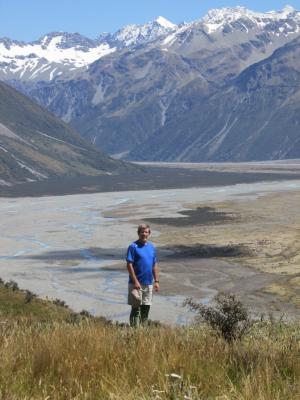 I have enjoyed the last couple of months taking a break in Aotearoa - New Zealand. Aside from visiting family and friends, I like the open spaces. Recently went with a friend to the upper Rakaia (see the accompanying photo). The mountains in the background still with snow and ice in the middle of summer are awesome, and it is so peaceful, with the murmur of the river drifting up from the valley. No wonder Peter Jackson filmed parts of "The Hobbit" and "The Lord of the Rings" in the vicinity. I don't care if it is "middle earth" or any kind of fantasy place - I just find it very appealing and very real and I had the chance to take some vivid memories to tide me over when I end up in more confined places Christmas tree2014-01-11 11:31:49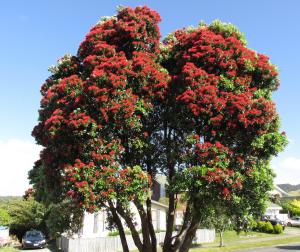 The "Christmas Tree" is a common custom today - even in modernised urban towns in Papua New Guinea (including artificial snow). However, it seems that the symbolic Christmas tree is relatively recent - the custom having developed in Germany in the 18th Century. Some scholars also trace the origin of evergreen trees in pre-Christian winter rites. Then there is the story of St Boniface and the conversion of the German pagans. In Aotearoa New Zealand much of the Northern winter symbolism of trees laden with snow and reindeer seems quite inappropriate since in the south it is the middle of summer and a time when people are on holiday, looking forward to a swim at the nearest beach. Fortunately the end of December is the very time that the Pohutakawa tree lining many of the beaches in New Zealand comes out in bright red flowers. The sturdy tree is there in bright spendour throughout the Christmas season. Some people call it our New Zealand Christmas tree! The timing is opportune, though a lot more thought would need to be put into linking the symbolism of the Pohutakawa and the European Christmas tree. 100th Birthday2013-12-27 12:15:56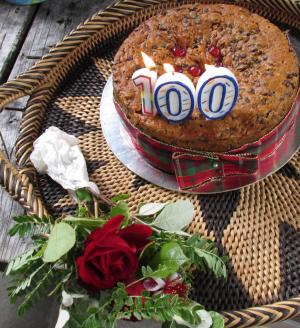 It was dad's 100th birthday, the day after Christmas, on 26th December. He was born in Wellington in 1913 and died in 1984. Harry and Mary had five children: myself, Catherine, Richard, Annemarie and Stephen. The 100th anniversary of dad's birth gave us the opportunity to come together and celebrate his life. With his grand-children and great-grand-children we ended up as 22 around a BBQ at Kaitoke Forest Park - a place that dad liked - but also now famous as one of the settings for the Hobbit film (Rivendell) - a beautiful area with Rimu, Kahikitea, Rata... huge trees in the indigenous forest. Modern2013-11-25 01:21:13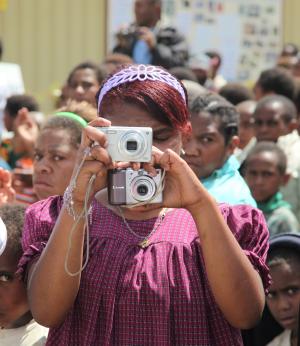 It used to be me taking the photos. Today at the Feast of Christ the King at Par Parish I noticed how many people were armed with cameras snapping away - videos too. Some even found ways to operate two cameras at once! It is all part of the rapidly changing scene in Papua New Guinea. The clothes, the hairstyles, the cars, and the attitudes all witness to the rapid changes and globalization. I feel almost like I have to run to keep up. Today at the Par celebration we remembered that it is 25 years since I celebrated the first mass there in the then "new" church building. (A film of the "Enga Mass" is available on my links page). Time goes so quickly, yet so much has happened since then. Solomon Islands2013-10-14 22:43:31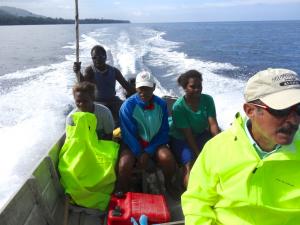 I have just returned from a two-week stay in Solomon Islands spending 4 or 5 days in each of the three dioceses – Honiara, Auki and Gizo. The purpose of the trip was for me to gain a better understanding of social concerns in Solomon Islands, to make contacts there so that I can continue to be informed. I also made myself available to help facilitate awareness of social concerns and the Social Teaching of the Church. In each diocese I was welcomed and provided with programs so I could meet people. I found it fascinating – in some ways like PNG but with many unique features too. I noticed many positive developments such as active youth groups, lively parishes, and groups deeply concerned with establishing peace and the common good. However there are also social concerns on issues such as: Logging, alcohol and drug abuse, violence, particularly family violence, teenage pregancies, corruption,Prostitution (commonly known as “solfish”), stealing by young boys (commonly known as “beliga”), land issues, mobile phones (in hands of young people showing sexually explicit pictures and movies), garbage and dirt, iInfrastructure in towns not able to cope with internal migration, marriage breakdown and having other partners (known as “O2”), school system not working, child abuse, sorcery. These are issues are not unique to Solomon Islands, but they do have their own particular characteristics in different locales. Some of these differed within the Solomon Islands dioceses. For example, corruption and land issues were noted more in Honiara; the school system not working well and poor infrastructure were noted in Auki, and garbage and dirt, teenage pregnancies, child abuse, and sorcery were more commonly noted in Gizo. The picture above is of us on a 3 hour trip up the coast from Auki to Takwa parish. Kiribati2013-08-21 16:21:14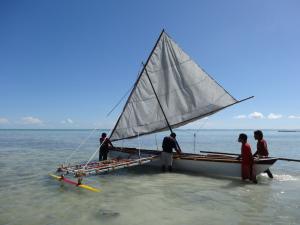 I spent the last 3 weeks in Kiribati. Some might ask – where is that? Well it is a nation comprising a group of 33 small islands (21 inhabited by a total of 100,000 people) occupying 5 million sq. km. of Ocean (equivalent to the size of continental USA or a little less than the size of Australia) situated half-way between Hawaii and Australia. The islands are coral atolls – most with their highest point less than 3 m above sea-level. Why go to Kiribati? I was there on behalf of Caritas Australia enquiring with people and organizations there to get a sense of emerging development issues with a view to identifying possible entry points for Caritas Australia’s re-engagement in Kiribati. What struck me about the visit? Firstly the kindness and hospitality of the people. Then there is the amazing experience of never being away from the sound of the sea. In fact the islands are just tiny strips of coral with the ocean on one side and a lagoon on the other. Certainly they will be most vulnerable to any significant rise in sea levels. I was most impressed by the inculturation of Christian (mostly Catholic) faith there. I noticed how people were preparing for the feast of the Assumption to be celebrated with song, dance and feasting. The week prior there were processions and various other activities. I attended some of the rehearsals by the youth and was quite astounded by the power, enthusiasm and skill of their performance. Amazing how a visit to such tiny islands can expand one’s consciousness! Witchcraft-Sorcery2013-06-30 12:35:31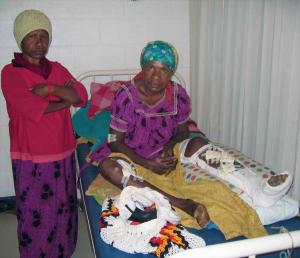 Of late (plarticularly after giving a paper at a meeting at ANU in Canberra) I have been receiving requests for information on witchcraft and sorcery in PNG. It is true that someties following death or misfortune some people here will ask "who" is behind it, and they may hire a diviner or a "witchdoctor" to find out. Those accused may be tortured, killed, or sent away from the area and their land and belongings taken. It is part of a traditional pre-scientific worldview that continues and even adapts to modernity. The situation cannot be ignored because people are suffering and some are dying. In response I have been sharing strategies promoted by the Diocese of Kundiawa that try to counter this situation. Such strategies involve 1) Having a respected pastoral presence at a funeral. 2) Encouraging a family member to "own" the situation and to ask peorple for respectful mourning, not accusations. 3) Proposing other more medical-scientific reasons why a person might die. 4) Promoting a Christian view of death - moving the conversation from blame to thanksgiving for the life of the deceased. 5) Helping to promote law and order in society. It is not easy, but we try to make some headway. The photo shows a woman I visited in hospital She is recovering from terrible injuries after being accused of witchcraft. Violence2013-05-25 17:05:25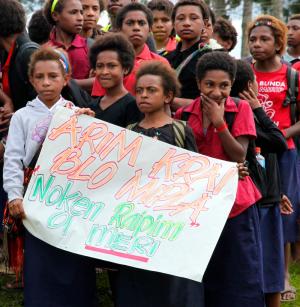
There is a lot of talk these days about violence in Papua New Guinea. Sadly the talk is not without foundation. There have been some a number of cases of brutal torture and killing of people accused of witchcraft (mostly women) and domestic violence seems to be occuring like an epidemic. Some media take the opportunity to gather sensational stories. I am trying to work more on the side of those trying to discern the causes and with those attempting to do something to improve the situation. Last week there was a national “haus krai” (day of mourning) where people from all over the country were encouraged to speak out against violence, particularly violence against women. I visited the nearby primary school where the students participated in a time of prayer for those suffering from and affected by violence. Then in groups they paraded around the school grounds with posters they had drawn. The photo shows a group of girls with one of their posters. The words on the poster (in Tok Pisin) say "Listen to our cry. Don't rape women." Forty Years2013-02-17 23:38:08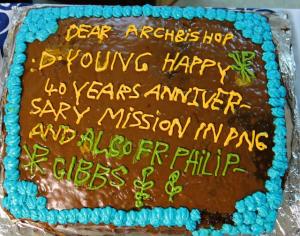 This evening Archbishop Doug and I celebrated 40 years in Papua New Guinea. We both came as students on an Overseas Training Program back in February 1973. We spent a month in Madang learning Melanesian Pidgin language and then came up to what was then the Enga District (this was before PNG independence) where I started at Par parish. Ten years later I was to return to that same parish as parish priest. At first they called me wane (boy), later it was man (akali), then a few years ago I heard someone referring to me as kawange (grandfather). Maybe next time it will be yumbange (ancestor)! This evening we had a little party and both Archbishop Doug and I spoke about highs and lows, but that overall we have no regrets and we would not want to be anywhere else. Sister Josepha made a nice cake that she proudly decorated with coloured writing... Christmas 20122012-12-31 23:38:30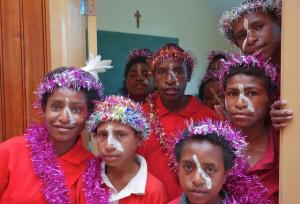 Christmas is a special time for children. That is certainly true in the parish where I celebrated Christmas this year. The junior youth, now on school holidays, were happy to have a chance to practice songs and dances in preparation for the Christmas night mass and again in the celebration on Christmas day. Some people would like to commercialise Christmas in Papua New Guinea, but still in most places here the priority is that of worship and also of coming together as an extended family. Buses and flights are full with people returning "home". The arrival of relatives with paid employment also provides an opportunity for customary funerary or marriage payments. In my homily on Christmas day I put a question to people. You say that PNG is a Christian country and that you people are Christians. If that is the case, then why is there so much domestic violence, corruption and accusations of witchcraft? There were/are no ready answers to such questions. I would not want to focus on the negative. In fact, in my view people here are richly blessed with arable land and relative peace. They might wish for more modern conveniences, such as electricity or water on tap and hopefully one day they will have access to such things. In the meantime they make do with what they have. This applies to the children too. They do not have complicated toys, but construct their own from wood and earth and stone that are here in abundance. Film making2012-12-02 20:18:53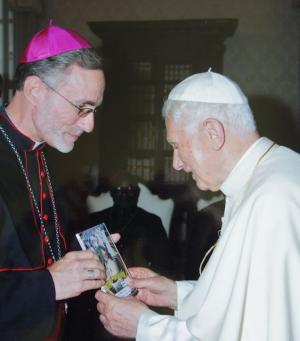
I'm not sure when I started making films or videos. I remember in the 80s working onthe "Enga Mass" film. In the 90s there seemed so many colourful events happening that were crying out to be documented. Ten years ago I began to realise the importance of media for awareness raising and joined with Sr Zelia in making a film about HIV and AIDS in Porgera. Earlier this year, with Fidelis Sope, I made a film about the ordination of the Catholic Bishop of Mendi. At his recent "ad limina" visit to Rome Bishop Don presented a copy on DVD to Pope Benedict (as you can see in the photo here). I don't know if the pope ever had time to view more than the cover. Film making is very time consuming - especially when it is not one of my official jobs. Often it ends up getting squeezed into moments between other tasks - sometimes late at night. Of course it is nice when I hear that a film has been selected to go on the local TV. Links to some of my films may be found in the "links" page on this website. I am self-taught and certainly an amateur, and recently I have been trying ways to to pass on what I have learned to some Papua New Guineans so that they can carry on the work of conscientisation and critical awareness. Kapo Island2012-10-08 00:36:35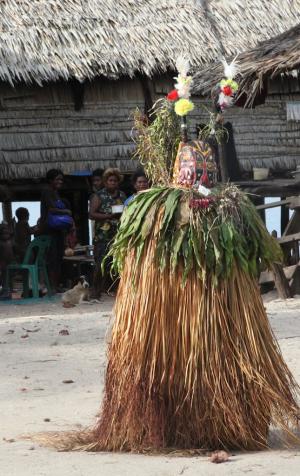
At the end of September I had the privilege of visiting Kapo -- an island village, west from Kimbe in the West New Britain Province. The 700 Kove people sustain themselves with a combination of fishing and vegetable gardening. Their mainland vegetable gardens and source of fresh water are a 15-20 minute canoe ride away. The Kapo villagers have been alarmed to see the customary lands of nearby villages first cleared by logging and then converted to oil palm plantations. They have seen other communities affected by land degradation associated with oil palm, and waste in rivers which kills fish and damages mangrove forests. They have also felt the effects of climate change with extra large tides washing right through the village. For several years, Caritas Papua New Guinea’s Advocacy Programme has worked with communities in Kimbe, helping them to better understand the impacts of
allowing their lands to be converted to large-scale oil palm plantations. So people are looking for options to earn income, given the widespread poverty that exists. Some fear that future community leaders might succumb to short-term economic incentives offered by palm oil companies in return for buying or leasing land. Now, the Diocese and Caritas Papua New Guinea, supported by Caritas Aotearoa New Zealand, are trialing alternative cash crops such as cocoa and coconut, which already grow in the area. The project involves growing seedlings, maintaining the plants, and training for controlling weeds and pests in a sustainable way. I went there to document progress and at the same time took the opportunity to see first-hand the fascinating life of this coastal people. The photo shows a special ritual figure called a Tumbuan parading in the village before an initiation rite ceremony. Gender Justice2012-09-17 21:20:30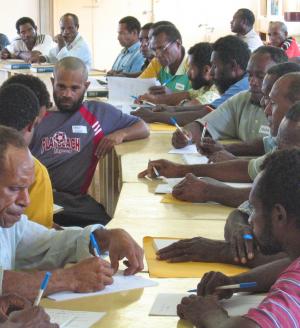 In the UN and NGO world there is much discussion about Gender Issues in PNG - particularly Gender related violence. PNG ratified the UN Convention on the Elimination of Discrimination against Women (CEDAW) in 1995. However, it is one thing to assert legal rights and another thing to implement or enforce them. I have been meeting with men and discussing issues of gender related violence with them. With traditional initiation rites now no longer practiced, many men encounter difficulty in affirming their masculinity, particularly in the urban setting and when their wife might have employment and be "provider" for the family. Traditional values tend to be patriarchal with the public voice monopolised by men, and with women following stereotyped roles. Now PNG faces rapid social and change and ideas, values and practices are changing, and this affects gender relations too. Working with men, I am faced with the issue of how to approach Gender Justice - whether from a personal, a communal, a religious or a human rights perspective. The latter tends to rely on a modern worldview with the autonomous individual making decisions - an approach that that appears somewhat foreign to the PNG context. I place a special emphasis on utilizing the social teaching of the Church to help interpret the cultural world of international Human Rights so that gradually we redefine the boundary lines of what is acceptable and what is abuse when it comes to Gender Justice Hagen Show2012-08-11 17:42:43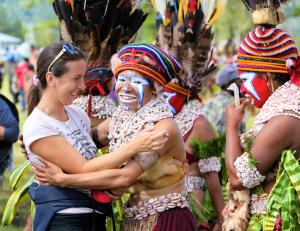 Today we had the annual "Hagen Show" here in Mount Hagen. I first attended the Show 39 years ago in 1973. Every year it was different. This year it was held in the Diocesan sports ground just over the fence from my house. Sometimes it comes across to me as a rather alienating neo-colonial affair, but this time - at least in the early stages when I attended, as people were putting on their finery before entering the fenced sports ground - I was struck by the two-way interaction. A lot of tourists came along with their cameras (the show is a great display of the latest in camera equipment). But then the local people were observing the tourists and made efforts to communicate with them. Many people from Mount Hagen speak English well, which helps, but also tourists came with guides and translators, so there was a good deal of friendly talk, asking questions, comments and so on. That is the way it should be. I think this photo illustrates what I am referring to. The gesture caught my eye as the two women - who normally live "worlds apart" embaced before going their ways. Elections2012-07-07 18:36:13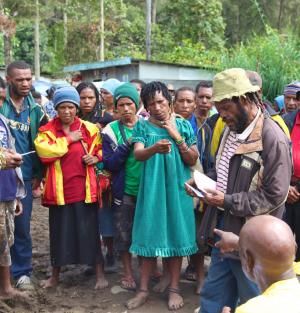 Every five years Papua New Guinea goes to the polls to elect a new government. This time there is more at stake as the PNG economy is booming with various mineral, oil and gas resource projects, and those elected to office have a lot of say in what will happen to the royalties and spin offs of these projects. Unfortunately for the average villager little has changed. In fact, for many in rural areas services have deteriorated. The photo is from polling day in the Enga Province. The electoral roll is organised in "family order" so the head of a family is called and we see here how he has taken the ballot papers with other members of his family - wife, siblings, cousins - watching. He may give some papers to them to sign for the three choices in the Limited Preferential Voting system. More likely though he will give the papers to the representative of the candidate the family has chosen to support and that representative will fill in the voting papers for them. It is not that everyone is illiterate - most have been to school, but more a matter of transparency. They will have received favours in cash or kind from the candidate and expect more in the future so it is important that it be clear who they have "voted" for. The elections continue over a number of weeks, with police and defence force providing security so ballot boxes are not highjacked or otherwise tampered with. Hopefully the process will conclude before the end of July and they will then form a new government. I am leading a domestic observer team of six local people and we will produce a report to go to the electoral commissioner at the end. Paiela2012-05-20 00:37:58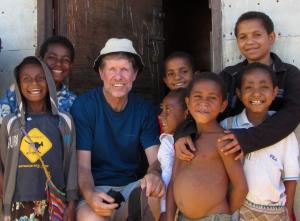 I first went to the Paiela Valley 39 years ago. Then we would either fly in or walk (12 hrs). I have many memories of the time there as a student (1973-4) and later as Parish Priest (1979-83). The isolation of the valley has meant that the people have not faced the dramatic changes of their neighbours in Porgera (Porgera Gold Mine). Last weekend I visited Paiela again, saying mass in the church we build 30 years ago. Many of the older people have gone - they have either died or have moved to the bright lights of Porgera. But the children are still there - new faces. Often though I recognise their parents in those faces. Now one can drive the car part of the way (over the highest road in PNG at almost 3.5 thousand meters). Then there is a 5 hour walk along what used to be a navigable road, but now impassable with collapsed bridges and landslides. The visit stirred up many memories. I hope I can visit again sometime and stay longer. Men's Clinic2012-04-26 22:29:35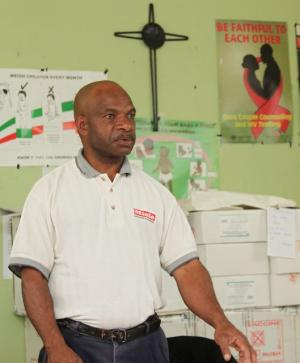 One of the constructive strategies coming out of our STI and HIV research for Caritas Australia has been the establishment of a men's clinic in several health centres. We found that men are often quite reticent to come to the regular out-patients clinics especially when it might involve examination by a female health worker. So, to encourage men we started with men's clinics once a week where men can come and in most cases they can consult with a male health worker. They feel more relaxed about speaking with or being examined by a man. In addition, while they wait they can watch videos on relevant themes such as about sexual health or dealing with domestic violence and family life. The clinics have become quite popular and now some men are coming with their wives, or it could be the other way around with a the female partner bringing her male partner along. She might have been diagnosed with an STI at the antenatal clinic, so then they come together to the men's clinic where he can be tested, given advice and if necessary given medication. The photo shows George Kelly a male health worker at Mingende Rural Hospital. George is giving a talk about sexual health to the men who are in attendance. He will then retire to a back room for individual consultations. As research advisor I am helping to monitor and evaluate the program. Port Moresby2012-03-31 12:33:23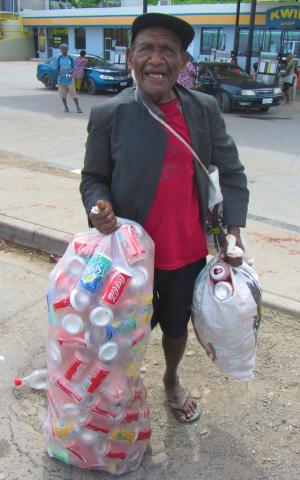
Port Moresby, the captial city of Papua New Guinea is not my favorite place. Some polls have found it to be among the 10 least desirable cities in the world. Yes -- it is not easy to work there with powercuts, flooded and congested roads, offices crippled by corrupt practices, and a law and order situation that fluctuates from risky to just plain dangerous. However there is another side to it. One meets amazing people, full of life and making the best of the situation. Last week while visiting Port Moresby I met Mr Okamo. He is originally from Chuave in the Simbu province of the Highlands. He flew to Port Moresby (there is no road access from the Highlands) some years ago to visit some of his relatives and has remained there ever since. He earns a meagre living by collecting empty plastic bottles and soft drink cans which he then sells. He doesn’t get much and it is tiring going around in the hot sun searching the sides of the road for things that others have thrown away – but it means he can contribute his part to the crowded family situation where he lives in the settlements. There are many people like Mr Okamo in Port Moresby and I sometimes need to make a point of speaking with such people as it helps provide a counter to the more dehumanising side of life there. Development?2012-01-22 19:06:18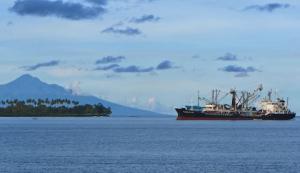 Development is how you manage change. Unfortunately much of the so-called development in Papua New Guinea appears to have its foundation in economic rationalism with change coming through externally directed forces. One-way communication supplies information to “beneficiaries” in order to gain or maintain the social license to operate. Too often this involves “ground-breaking” ceremonies, without the necessary “ground-work”. Most of the decisions are taken in the capital city Port Moresby with little direct consideration for the local people who will be most affected by the projects. The Pacific Marine Industrial Zone (PMIZ) planned for a site near Madang on the North coast of Papua New Guinea will be the first Special Economic Zone for the country. The idea behind the PMIZ is that if PNG could value add to their fisheries resource by on-shore processing, that could bring economic benefits to the country including employment and improved infrastructure. However, there is also a social dimension and it is hard to know beforehand whether the balance will go in the direction of a better standard of living and way of life for people, or whether the area will become inundated by problems associated with workers from overseas, settlers coming in from other parts of PNG, the abuse of alcohol and drugs, prostitution, and so on. There is also the issue of what the effect will be on the environment. This a challenge for the Church and the local and national leaders. Unfortunately political rivalries, and fragmentation within the local communities does not augur well for the future. Mistrust and infighting could distract attention from how we might managed change as fruitful development. Christmas2011-12-26 00:22:04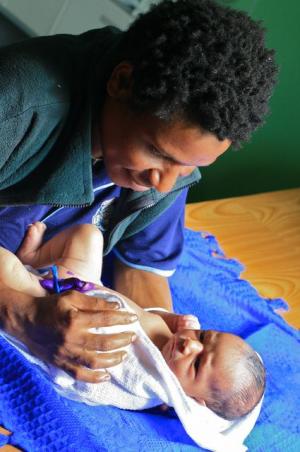
Christmas is celebrated in various ways, but it has special religious significance in the Christian calendar. Last night I joined people in a chapel in the countryside to celebrate Christmas with them, and today – Christmas Day – we had the cathedral at Mount Hagen overflowing with families from near and far. It is a special day here in Papua New Guinea. I also recall today how the maternal death rate here in Papua New Guinea is one of the highest in the world. What a Christmas present it would be to improve the health services here, particularly those for mothers. Today in my homily I included the following (here translated into English from the original Tok Pisin). “Recently I was talking with a woman who had been cruelly treated by a man. She left him and nursing her wounds she commented to me, ‘I guess all men are the same, I think I’ll have to wait for a man to come from the sky!’ She was looking for the perfect man I guess. The only perfect man I know is Jesus and he didn’t come from the sky. He was born from a woman and her name was Mary. That is what we remember at Christmas. We cannot see or touch God. But we can hold a baby. We can see and touch a man. That is why God sent his Son Jesus to be one of us and in that way to show love and mercy – not from the sky or the clouds, but here on earth where we are. He became a man so that he could touch our human hearts.” Research2011-11-12 01:15:54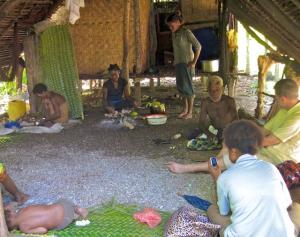 Research takes me out into communities to talk with people and seek their views. One of the projects I am working on is to seek the views of people concerning the Government’s intention to establishment of a Special Economic Zone (SEZ) for tuna processing. An SEZ will means major changes for the the local people both for the environment and their way of life, and in terms of the make-up of the community. Run well SEZs can bring employment and economic growth. Managed and monitored poorly they can be oppressive for the workers and the local people. The accompanying photo shows a typical scene from a coastal village in PNG, with myself on the right speaking with a leader. In the remainder of the photo, moving clockwise you can see a co-researcher checking her mobile phone, a child asleep, the leader’s wife peeling vegetables at the rear and two young women cooking pieces of tuna over an open fire. On the Road2011-10-14 01:49:55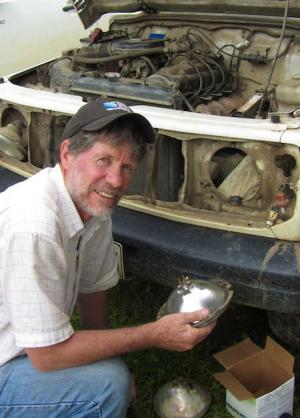 I am “on the road” a fair bit. Sometimes it involves flying with Air Niugini, as the capital city Port Moresby has no road access. At other times I am literally on the road, either in a mini-bus (called a public motor vehicle or PMV for short), or in the Suzuki 4WD provided by my missionary congregation. The Suzuki is over ten years old and has already started a second round on the odometer. Many of the roads in Papua New Guinea are unsealed and with deep pot-holes, so maintenance is important. The other day I got a stone through a headlight. In the photo you see me fitting a new one. Sometimes I change from thinking about being “on the road” to being “on the way.” That is an expression used on some parts of the Gospels, such as Mark 10:52 where Bartimaeus, the blind beggar was healed and then followed Jesus “along the way.” It was an expression used for Christian life in the early church and later was used in relation to pilgrimages, particularly the Way of St James – the camino or pilgrimage to Santiago de Compostela in Spain (the theme of a recent film with Martin Sheen). Life is a journey. I like to think of it also as a pilgrimage. Viewing it that way helps transform the stones and the rattles and the bumps from a source of annoyance to path of fascination. Three Zeros in S.Korea2011-09-02 18:59:18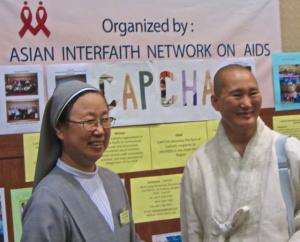 I was invited participate in the conference in South Korea organised by the Asian Interfaith Network on HIV/AIDS (AINA) and INERELA (International Network of Religious Leaders) as part of a regional HIV and AIDS Congress (ICAAP 10). There were various interesting sessions, such as about “Getting to Zero” (zero AIDS related deaths, zero new infections, zero stigma and discrimination); “Diverse Voices, United Action”; working groups on Human trafficking, Key affected Populations and Advocacy/ networking. There was also a “marketplace” of best practices by the various faith groups (Catholic, Protestant, Hindu, Buddhist, Islam). A number of issues surfaced – for example the question of decriminalization of sex work and sex between men (and between women). The point raised was to find ways to promote human rights for all people, yet to be culturally sensitive. I also found a session on Social Protection intriguing. Examples were given from India, Thailand and China, about overcoming barriers to employment, loss of income and addressing discrimination. I wondered how we could deal better with social protection to reduce the vulnerability of affected groups in PNG. The most challenging aspect for me was the input by the UNAIDS representative. She issued a clear invitation for the Faith Based Organisations to contribute their voice to the ongoing response to HIV and AIDS. “Be engaged, be visible.” “There is a place for you at the table – how do you want to occupy that.” To respond to such challenges might mean us as Church leaders/members thinking outside of our comfort zones. Settling in2011-07-22 23:34:34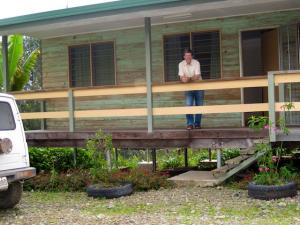 I am settling in to my new home in Mount Hagen, the largest town in the PNG Highlands (pop. approx 40,000 people). Mount Hagen is a pleasant place at an altitude of 1700m, with a daily maximum temperature of 27 C and a low of 11 C at night. It rains most days (afternoons). It is possible to drive the 400km from the coast (Lae) to Mount Hagen along the Highlands Highway, the trip taking about 9 hours. There are also daily flights with Air Niugini to the capital Port Moresby. From Mount Hagen the road leads further west to Wabag and Porgera in the Enga Province, and Mendi and Tari in the Southern Highlands Province. I live at the headquarters of the Catholic Archdiocese of Mount Hagen. The Church complex has a primary school, a vocational school, an urban clinic and an HIV and AIDS Voluntary Counselling and Testing Centre, workshops, several houses for sisters, priests and brothers and other church personnel, and the various offices of the Archdiocese. It even hosts the town rugby field. I live in one of the guest appartments (though I am now no longer a “guest”). I am gradually setting it up to be “home” and “office” combined. Just this week I put in shelves so I have been able to unpack my boxes of books. Next task will be to sort through the archive boxes full of files. Of course soon I must arrange a house-warming party with my neighbours. Return to PNG2011-04-26 13:51:44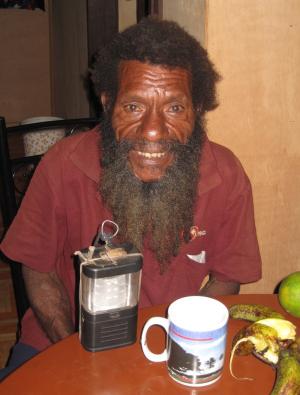
I arrived back in Papua New Guinea on 16th April and left Mount Hagen to spend part of Holy Week and Easter in a rather isolated Christian community called Geg, in the Baiyer District, not far from the Jimi River. I enjoyed being with the people for the occasion, though the joy lessened somewhat when we held a funeral service or a young woman who had died of AIDS. Late on Thursday evening there was a knock on my door. It was catechist Joseph from another community some 4 hours walk away. He carried a tiny lamp and a small netbag. He wanted to lead the people in a communion service the next day and had come asking if I could provide him with a container with Holy Communion to take back. We talked. He seemed an interesting fellow with bright eyes, a long unkempt beard, and he spoke rather colloquial Pidgin. He was tired and hungry, so we shared some fruit that people had left in my house. Catechists like Joseph are often the mainstay of isolated communities – working for many years with little recompense apart from knowing that they are contributing to the life of the community.
"Lucky Country"2011-04-10 19:00:46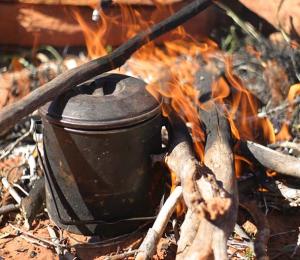 Back in the 60s Donald Horne wrote a rather cynical view of Australia, calling it the "Luck Country". As it has turned out, Australia is indeed lucky - with natural resources, no earthquakes and a fair distance from most of the problems elsewhere in the world. The prosperity of Australia is striking after my having lived 6 months in the USA. There is an energy and vibrancy in the market commerce and restaurants here that is less apparent in USA - aside from Times Square that is. However, I would not want to ignore the fact that there is still a huge gap between the well-being of many indigenous Australians and others in society. These days the streets of Sydney are witness to the multi-cultural dimension of Australia today - and it seems to me that the language heard in the city street is sounding more "American" these days, and less that of the classical Aussi accent of Geoffrey Rush as Lionel Logue in "The King's Speech." I have been lucky to have studied here (University of Sydney in the 70s), hitch-hiked the length and breadth of the country in my younger days, visited the "Centre" (Alice Springs and Santa Teresa) not as a tourist, but as a guest, enjoyed the World Youth Day celebration three years ago, and had my arm repaired after a road accident two years back. This time I have been a Visiting Fellow at the University of NSW, working on an article or two. As a satyrical book notes - "They're a Weird Mob," but also a good mob to be with so long as one doesn't say anything about how the All Blacks are going to win the Rugby World Cup. La Paz Landslide2011-03-16 11:30:32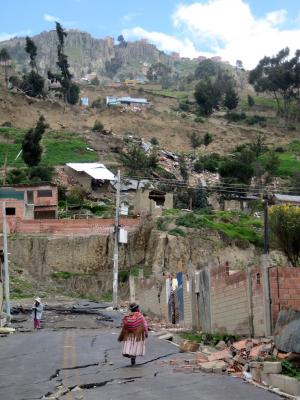
If you had to leave your home and were allowed to take only five items with you – what would you take? That is a question from a game about choosing priorities. Recently the game became a reality. I was visiting Bolivia with the intention of learning more about indigenous theologies and also to visit Fr Dennis Nyaura SVD, a missionary from Papua New Guinea. I was with Fr Dennis in Cochabamba when a telephone message came through that there was a landslide in the city of La Paz and that our SVD confreres there had been told they might have to evacuate their house in the barrio of Callapa for fear that landslide would engulf the whole area. That is shocking news in itself, but what added to my concern was the fact that my computer containing all my research work, along with important documents such as my passport were in that house. That Saturday night the Divine Word missionaries and Sister Servants of the Holy Spirit in the barrio of Callapa received phone calls from families in a nearby barrio asking for help. The SVDs went to help and the sisters invited evacuated families to come and sleep at the sister’s house. But they got a shock when they opened the door on Sunday morning and saw huge cracks opening up in the neighbourhood. Everyone had to evacuate. Now many people are camped with some of their possessions and are being cared for by church groups and the armed forces. There are other countries where looting and chaos would take over in such a situation. This did not happen in La Paz. Despite the terrible loss in material terms people have demonstrated heroic solidarity. It has given me a chance too to consider my sense of priorities. My SVD brothers saved my computer and my passport and I leave Bolivia deeply impressed with the way people have cared for and supported one another during this time of natural disaster. See photos on Picasa at https://picasaweb.google.com/Gibbs199/BoliviaLandslide?authkey=Gv1sRgCJaa2vSuxu2fPg&feat=directlink
VIVAT - Let live2011-03-15 23:26:24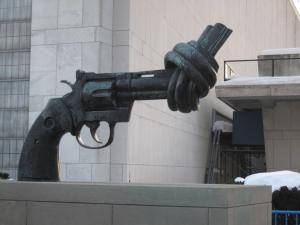
In part of January and February I had the opportunity to spend four weeks with the VIVAT executive team in New York. Fr. Felix Jones and Sr. Zelia Cordeiro welcomed me, organized a security pass for the UN complex and arranged that I could attend sessions of the Economic and Social Council and a number of other sessions and gatherings. Prior to my coming I had thought of the UN mostly in terms of the General Assembly and the Security Council. So it was an eye-opener for me to learn about so many other bodies within the UN framework, and particularly the way NGO’s such as VIVAT participate in this international forum as advocates for issues that affect people in developing countries. The reality of poverty and inequities, as perceived from communities and grassroots, is different from top-down views. The executive team has a small office on the seventh floor of a tall building in Manhattan, New York; about ten minutes walk from the main UN compound. The office serves as a base for a variety of activities. A typical day might start with a short team briefing, attending to urgent correspondence, then a meeting with members of other NGOs concerned with one of the four principal concerns of VIVAT: respecting human rights, eradicating poverty, gender justice, and environmental issues. When UN Commissions are in session, such as the Commission for Social Development or the Commission on the Status of Women, the Commission on Sustainable Development, or the Permanent Forum on Indigenous Issues, there are many events to prepare for and attend. Felix and Zelia helped arrange for me to visit and talk with the UN Human Rights Advisor, and there was also a chance to interact with Amnesty International, Human Rights Watch, and many NGO groups. VIVAT (meaning “let live”) is a special ministry and a prime opportunity for prophetic dialogue today. Like most areas of dialogue, immediate results are not readily apparent and it might take a number of years for benefits to appear. Still it was a very interesting time and a very helpful preparation for future ministry in the field of Social Concerns.
Catholic Church2011-03-14 20:05:22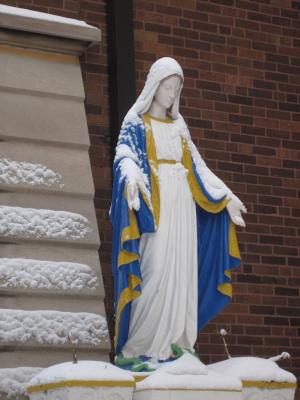 Coming from Papua New Guinea to the USA – what is my impression of the US Catholic Church? It seems to me that it is in a state of crisis and seriously divided. Disclosure of widespread abuse and cover-up in numerous dioceses has resulted in church leadership - and in many ways the church as a whole - to have largely lost moral credibility. I agree with my friend Dr Luisa Saffiotti that the problem is far wider than the pathological behavior of a few priests and religious, and has more to do with a combination of the exercise of power and promotion of dualistic teaching on sexuality, reinforced by a clerical culture. Power is relational and intended for service. However too often fear of the loss of power and control that would result from the “scandal” if the truth would be told, has contributed to the real scandal of a Church system that has ended up trying to protect itself. The Roman inquiry into the lives of women religious in the US and the present attempts to roll back Vatican II in terms of doctrine and liturgy do not help either. So, what has been my reaction and response? I have never been much in favour of clericalism and the cultic model of priesthood associated with a culture of privilege, secrecy and exemption. From experience I think many seminaries promote psychosexual and emotional immaturity. There are good formation programs too and I am grateful that the SVD (and the atmosphere around Catholic Theological Union in Chicago) generally promote a healthy approach to life. However, it has been a shock for me to realize that I can’t simply point a finger from afar at offenders, because I am part of the system and part of the institution too. If the solution is not simply penitence but structural change, then I have a responsibility also to be active in promoting that change. How best to be part of change that will lead to greater justice, human dignity and relational maturity? Back in New Zealand I have had my first experience of the new English translation of the mass – a translation from the Latin, along with restorationist fervor. How is one to pray devoutly using a text that has been imposed? That is where my recent experience in Latin America helps. People there have survived the conquest, the banishment of the Jesuits, oppressive social structures and the like, and yet still so many are faithful and they know how to celebrate life. I have seen how important it is not to let the oppressor “win” by allowing oneself to be oppressed. Though different from the USA and NZ, no doubt the life of the Church in PNG will have its own share of challenges. Catholic Theological Union2011-01-17 07:51:13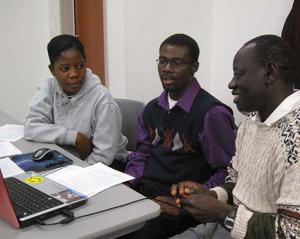 In the final months of 2010 I have been in Chicago teaching and taking courses at Catholic Theological Union in Chicago. CTU is the largest Catholic Graduate School of Theology and Ministry in the US. I have enjoyed my time here with the excellent facilities and a talented group of students and faculty. There are about 500 students coming from over 30 different countries. The accompanying photo shows three friends from Africa studying at CTU: Immaculata from Tanzania, Silvan from Togo and Secondiano from Sudan. CTU came into existence in 1968 when several religious orders decided to merge their respective schools of theology based on a model of collaboration, following the Second Vatican Council. It started out as a school for priests, but after a few years opened to lay students, enabling lay women and men, religious sisters and brothers, priests and seminarians to study together. Today there are 32 religious orders that send students to CTU and half the students are lay students from the US and other countries. I studied theology at CTU in 1974-78 and it has been fascinating for me to return over thirty years later. CTU is situated in Hyde Park on the south side of Chicago, near the University of Chicago. It is only a few blocks from Lake Michigan and when I am tired of the library there is always a chance to be refreshed with a stroll along the lake shore. I have seen it transformed from green to Autumn colours and now the white of winter snow and ice. Northern Italy2010-12-27 17:36:18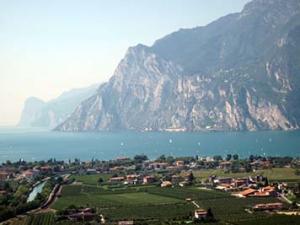 While studying in Rome in the 90s I used to take my holidays in Northern Italy - in the mountains near Trento. That includes the Dolomites and other mountain ranges not quite so famous but also spectacular. Special friends there include Giacomo and Silvana and their families. I had the honour of officiated at their wedding many years ago. This year I had the chance to visit again, to stay with Giacomo and Silvana and their children Filippo and Emma and to enjoy again the company of their extended families. We also visited Annamaria who had worked with us at the SVD house at Baleno near Riva del Garda. I enjoyed the village feast day celebration, walks in the mountains, visits to very old villages such as Arone. Times are changing. Much of the industry is moving to "Eastern" Europe where production is cheaper. But the hospitality and generosity still leaves an deep impression. An album of photos from the time is available in the "Links" page of this website. East Asian Pastoral Institute2010-09-13 04:30:52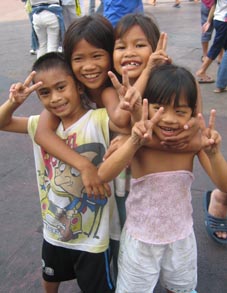 The East Asian Pastoral Institute (EAPI) based in the Jesuit run Ateneo de Manila University is one of the principal centres for theological and pastoral formation in the Asia-Pacific region. I was invited to teach there about eight years ago, and since then have gone almost every year to present a course on "The Churches of Oceania and Emerging Theologies". It is a "block" course with five hours of class each day for a week. The course also includes film evenings with films such as "Whale Rider" and "Rabbit-proof Fence". Afterwards we discuss points about culture and spirituality raised by such films. This year there are 47 participants in the Pastoral Renewal Program, coming from 13 different countries: Bangladesh, China, India, Indonesia, Kiribati, Korea, Malaysia, Myanmar, Samoa, Sri Lanka, Thailand, Vietnam, and Zimbabwe. Of course many work in other countries too. One of the Indians serves in Papua New Guinea. There is also an opportunity to mentor students continuing studies towards an MA degree. Before the course many of the students know very little about Oceania. I try to make the classes as lively as possible, illustrating with video clips and music. The students say they find it interesting and I enjoy the opportunity to share at least a small part of what the churches of Oceania have to offer. Micronesian Seminar2010-09-05 23:28:40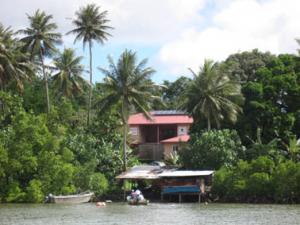 Micronesia by definition ("micro") comprises small islands - but the area covered in terms of the Ocean is immense. During part of July and August 2010 I was privileged to have an opportunity to visit Micronesia - particularly Pohnpei - the site of the Jesuit-run "Micronesian Seminar". The Micronesian Seminar began in 1972, running workshops for missionaries and annual conferences on matters of social concern. Since then it has developed into a centre with an extra-ordinary collection of documentation on socio-cultural and political-economic matters - with a library of over 30,000 volumes, an archive of some 60,000 photos (digitalised and catalogued), over 10,000 music files (digitalised and catalogued), plus hundreds of videos - including videos produced at the Micronesian Seminar. Much of this is available online at www.micsem.org. Fr Francis Hezel SJ is the motivating force behind this up until today.
I was impressed by the professional, well-organised setup there at Micsem in Pohnpei. One also finds there information on the whole of Micronesia
Lengthy transport channels impose limits on personal visits, however with the development of the internet and related forms of communication I would hope that there might be more regular communication between Institutes in PNG such as the Melanesian Institute, the Seminaries, and Divine Word University, with the Micronesian Seminar - our not too distant neighbour. Filming in Nepal2010-05-19 07:21:26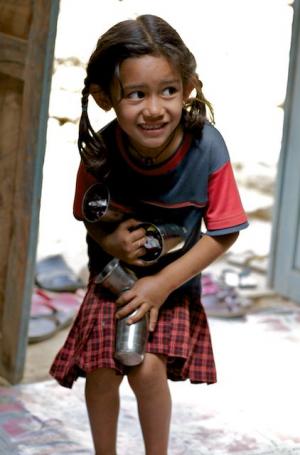 After Easter I got to go to Nepal with a group from Caritas Aotearoa New Zealand to help make a film about the effects of climate change. We were two weeks in the hills in the Syangia province. I was impressed by the way the people formed co-operatives, developed tree planting programs and so on, along with the help of Caritas Nepal. The photo of the young girl carrying cups (to offer us a drink) ended up on a Caritas Internationalis card! You can view the film by Splashroom Media at vimeo.com/13985135 |
